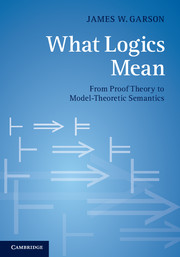Book contents
- Frontmatter
- Dedication
- Contents
- Preface
- Acknowledgements
- 1 Introduction to model-theoretic inferentialism
- 2 Deductive expression
- 3 Local expression
- 4 Global expression
- 5 Intuitionistic semantics
- 6 Conditionals
- 7 Disjunction
- 8 Negation
- 9 Supervaluations and natural semantics
- 10 Natural semantics for an open future
- 11 The expressive power of sequent calculi
- 12 Soundness and completeness for natural semantics
- 13 Connections with proof-theoretic semantics
- 14 Quantifiers
- 15 The natural semantics of vagueness (with Joshua D. K. Brown)
- 16 Modal logic
- Summary
- References
- Index
9 - Supervaluations and natural semantics
Published online by Cambridge University Press: 05 June 2014
- Frontmatter
- Dedication
- Contents
- Preface
- Acknowledgements
- 1 Introduction to model-theoretic inferentialism
- 2 Deductive expression
- 3 Local expression
- 4 Global expression
- 5 Intuitionistic semantics
- 6 Conditionals
- 7 Disjunction
- 8 Negation
- 9 Supervaluations and natural semantics
- 10 Natural semantics for an open future
- 11 The expressive power of sequent calculi
- 12 Soundness and completeness for natural semantics
- 13 Connections with proof-theoretic semantics
- 14 Quantifiers
- 15 The natural semantics of vagueness (with Joshua D. K. Brown)
- 16 Modal logic
- Summary
- References
- Index
Summary
In the last chapter, we established that classical propositional logic PL allows a non-classical interpretation of the connectives. In fact, the natural semantics ‖PL‖ for PL is a variant of an intuitionistic semantics, where (Refinability) is added as a side condition. The existence of non-classical interpretations for classical propositional logic is nothing new, for supervaluation semantics (van Fraassen, 1969) qualifies as another example. The purpose of this chapter is to compare ‖PL‖ with supervaluation semantics. There are interesting similarities. Section 9.3 shows that the partial truth tables for ‖PL‖ and supervaluations are identical. Furthermore, there is a way to map supervaluations in the canonical model of PL (Section 9.2). However, two differences will emerge that are decisive. Supervaluation semantics does not preserve the validity of the most basic rules of PL (Section 9.4). Furthermore, it will be argued in Section 9.5 that supervaluations do not really qualify as a semantics, for they do not provide truth conditions for the connectives of PL. The upshot of this discussion will be to recommend ‖PL‖ as better suited for philosophical applications where supervaluations have been popular. In coming chapters, we will demonstrate the point in detail by showing the value of ‖PL‖ for handling the open future (Chapter 10) and vagueness (Chapter 15).
Supervaluation semantics
Supervaluation semantics has many applications, but a seminal motivation was to provide for a Strawsonian theory of singular terms where some sentences lack truth-values because of the failure of the presupposition that their terms denote. Strawson (1967) argued that the value of ‘the present King of France is bald’ is not false as Russell would have thought. Instead it lacks a value because (presuming there is no present King of France) the sentence simply fails to make an evaluable statement.
- Type
- Chapter
- Information
- What Logics MeanFrom Proof Theory to Model-Theoretic Semantics, pp. 134 - 146Publisher: Cambridge University PressPrint publication year: 2013



